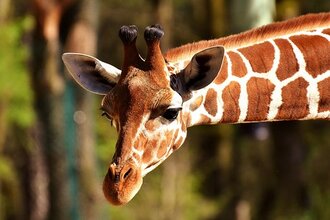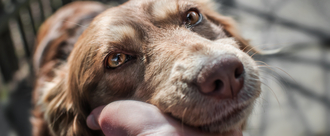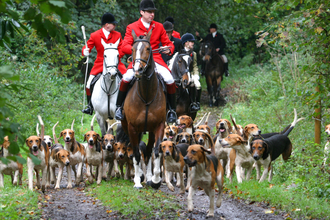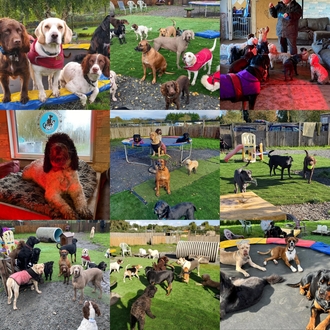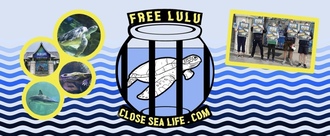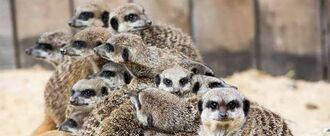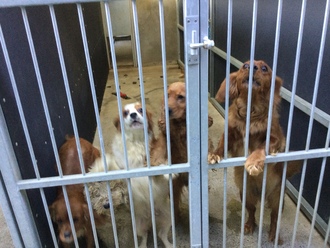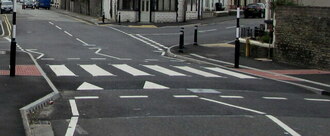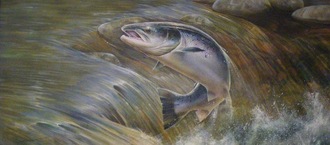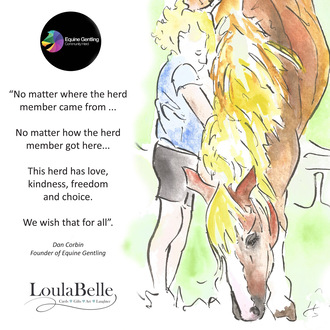-
Make the culling of healthy animals in captivity illegalMarius, the baby giraffe killed in Copenhagen then later dissected in front of visitors; A three month old baby bear in Sweden, killed because he was being bullied by his father, later stuffed to show the public; Nine lion cubs in Sweden, killed for being “surplus”; Sammi and Becca, two piglets in Edinburgh zoo, killed by the zoos vet to, ironically, adhere to the european breeding project in which “surplus” animals are to be put to death; A zebra in Norway, killed and given to a lion in front of visitors; seven healthy lion cubs killed in the notorious south lakes zoo just for being born; even as recent as April of 2023 in Dundee, Scotland, where four wolves were killed just because they displayed anxiety after their leader was euthanised following an operation. The list is horrifically long, too long to include here. The figure given by zoos in Europe for the number of “surplus” animals killed is 7,500, though the actual number is likely far greater. This is unfortunately taking place on a far too regular basis. Contemporary zoos and other animal organisations perpetuate their narrative of being for the safety and conservation of animals. In what way does culling animals that are healthy achieve this? Throughout the world, wild groups of animals are culled, the reason given being for the benefit of the group by removing ill or elderly members or condensing the group to prevent food shortages. This reason is also given for culled animals in captivity, however this issue is supposed to be impossible in zoos, and often one of the reasons that they are in captivity to begin with. If there are too many of an animal then they shouldn’t be in captivity as they’re not in need of conservation. There are a huge number of endangered or vulnerable animals that could be in conservation areas instead. Along with banning this hideous aspect of captivity, statistics for animal deaths should be published to prove they were necessary. While we unfortunately aren’t capable of changing the laws of these other countries just yet, we can demand justice for zoo animals in the United Kingdom, and urge the government to protect them from these disgusting, senseless deaths. After all, if you and your families lives were in the hands of others, wouldn’t you want them to be safe and free from an environment where whether they live or die is essentially a game of Russian roulette?82 of 100 SignaturesCreated by Rachel Redhead
-
Save dog rescues from having to shut up shop - putting thousands of dogs at riskThe dog rescue sector is already facing a major crisis. Following an explosion of dog ownership during Covid, the return to ‘normality’ has seen a huge increase in the number of dogs coming into the rescue system - with not enough space for them all. It means so many dogs that could go on to have happy lives in new homes don’t get the chance, and instead are being euthanised. And there's an even bigger crisis looming. Dog rescues need to have insurance cover to operate, but over the past few months more and more insurers have either withdrawn cover for rescues completely - including for long-standing rescue customers - and others have increased their premiums to an unaffordable level or put in restrictions that are unworkable for small charity rescues. If this trend continues, many smaller rescues will be forced to close leaving even more, healthy, well-adjusted, dogs with no-where to go. As a nation of dog lovers, do we really want to see mass scale euthanisation of dogs because of a set of ‘perfect storm’ factors driven by Covid? The approach being taken by insurers doesn’t penalise those that caused the problems, it just puts dogs and those that work responsibly to save them at risk. Instead of a knee-jerk withdrawal, the insurance industry should work with responsible rescues to promote good practices, ensuring future risk is sensibly managed. Without this the current crisis in the dog world will only get worse.34,853 of 35,000 SignaturesCreated by Pro Dogs Direct

-
Make all Fireworks Illegal for the welfare of ANIMALSThe more people that show support will let the government know that they would prefer to save there pets and all animals and people from the stress of bangs from the fireworks. Plus in the long run it would also save the government money in investing in drone and light shows.13 of 100 SignaturesCreated by Sarah Bryant
-
Time for change: no more fox huntingFox hunting, deer hunting, and hare hunting still take place in the UK. These cruel activities have been banned in England and Wales for nearly 20 years, but the law is failing us all. Too many animals are suffering, local communities are being abused and the public is being misled, as too many hunts are getting away with it. It’s time for change.88,197 of 100,000 SignaturesCreated by Time For Change Coalition Against Hunting
-
Save our Doggy Day CareDog Day Care has become a popular and valuable service which provides important needs for dogs such as exercise, socialisation and all day care enabling owners to go to work. There are so many benefits for dogs who attend daycare: they are more content, better behaved, well socialised around other dogs, less anxious and easier to train. Day care also creates a safe place for dogs to run around freely without disturbing members of the public. It's also secure so that dogs who have a high prey drive or cannot be trusted off lead can play and interact safely. Crufty Pups Creche played an important part and worked safely throughout Covid, meaning that key workers could still go to work and vunerable owners could isolate whilst still meeting the needs of their pets. We feel that this also prevented some dogs from having to be re homed or developing behaviours such as anxiety or losing confidence with social skills. If Crufty Pups Creche were removed from the land, we would be faced with little option but to close altogether since the set up costs to relocate would not be affordable. Not only is this place valuable to dog owners, but also the staff, volunteers, students who complete work experience with us and all of the dogs who spend their days with us. Please help us by signing this petition which I will be presenting to the council along with my special circumstances planning application.953 of 1,000 SignaturesCreated by Nicky Griffiths
-
FREE LULUTurtles live a long time, and normally cover thousands of miles. Laying thousands of eggs. Yet sadly Lulu is unable to do that in her tiny tank. Sealife in UK aquariums has no chance to exhibit natural behaviour. Instead, circling, head bobbing and spiralling. All evidence of zoochosis. Due to stress and boredom. It is time for the UK government to bring an end to turtles being held captive in the UK. Sealife belongs in the sea, not in tiny tanks. Over 80 years in captivity - 'FREE LULU' - It's time for Lulu and Gulliver to be free.1,028 of 2,000 SignaturesCreated by Close Sealife
-
Say no to euthanising animals of Southend Sealife CentreWhen purchasing any animal or aquatic creature, a responsibility is taken on to care for that creature humanely for the duration of its life. It is costly looking after creatures, nonetheless, at the point of purchase a commitment is made to adequately meet its needs for food, shelter, and giving a stimulating environment. The recent announcement that the animals and aquatic creatures of Southend’s Sealife Adventure and Wild Centre may be euthanised due to the rising cost of their care with the energy price rises is therefore not acceptable. This letter urgently calls on Philip Miller to seek alternative means to recover costs, safeguarding the welfare of these creatures throughout the winter, and to not euthanise any creatures on the grounds of affordability of looking after them. By joining voices we can persuade the owners of Sealife Adventure and Wild to save the lives of tens of creatures, including meerkats, monkeys, and sealife creatures, who may be euthanised due to cost saving measures.26,041 of 30,000 SignaturesCreated by Lydia Hyde
-
Make 'Swift Bricks' mandatory for all new build and extensions in SheffieldWe are having a swift emergency in Sheffield. Illegal work (Wildlife and Countryside Act), has brought SSN surveyors out to defend active swift nests from building developments in S6, S10, S13 and S17. These are not isolated incidents. The Common Swift isn't common any more. In the last 25 years, UK swift plummeted by over 60%. Swifts are Red Listed Birds of Conservation Concern and classified as "Endangered". Traditional building materials and methods left gaps for laying eggs and raising chicks, high up within the eaves. Modern plastic soffits and well-sealed, draught-proof buildings lack nooks and crannies. Up to now, few town planners, architects, builders, roofers and other professionals have cared about swifts (and other valuable wildlife e.g. bats). We have to change this before it is too late. Swifts fly from Africa to the same mate and nesting site, staying in Sheffield from May to August. If they return to find their nest site has been blocked off, destroyed or encased in scaffolding/netting, it spells disaster. Being non-perching birds, they will keep trying to swoop into their former nesting hole. They will persist for up to two weeks, sometimes ending in injury and death. We recently rushed to an emergency swift survey in Handsworth. Swifts zipped silently in and out of their eaves’ nests feeding their young, the residents unaware of them, likewise the soon-arriving roofers. Thanks to our intervention their chicks are safe and will have a chance. We got very positive reactions from residents and lots of interest in their amazing migratory life cycle. The 'feel-good' factor is probably helped by the fact that swifts are delightful neighbours, eating insects and flying around with amazing grace and energy. Swifts are clean, un-messy birds making secret, minimal nests that disappear over winter. Cheaply and easily, modern buildings and renovated old buildings can provide suitable cavities, without compromising the building’s interior. We ask Sheffield City Council to promote Swift Conservation’s recommended good practice: 1. Leave existing nest places undisturbed 2. If re-roofing, after the fitting of new soffits and gutters, make new nest access holes to match the old ones exactly. See “Creating Swift Nest Places in Old & New Soffits”, https://www.swift-conservation.org 3. New build - internal nest spaces “Swift bricks” are the best. A wide variety of commercially produced hollow bricks or blocks have a small entrance to allow swifts to build a nest inside. Integrated nesting bricks have advantages over external boxes, e.g. “Integrated nesting bricks are preferred to external boxes for reasons of longevity, reduced maintenance, better temperature regulation, and aesthetic integration with the building design.” (Westminster Environmental Supplementary Planning Document (ESPD)) @£15-30/unit, i.e. around 0.0001% of the cost of an average home. The number would depend on the size of the project, following the example of progressive councils. Government planning guidance highlights the wildlife benefits from 'Swift Bricks' (NPPG Natural Environment 2019 paragraph 023). 3. If you cannot do “3” above, fit external nest boxes Many councils such as Brighton and Hove, London, City of Westminster and Cambridgeshire are committed to swift conservation through planning. But, neither the current Sheffield Habitat Action Plans nor Local Plan currently cover building-based species. This is an opportunity to strengthen the council policy in this area. We must protect and aid the recovery of Sheffield’s swift population through forthcoming Local Nature Recovery Strategies. Biodiversity Net Gain will soon be mandatory in England for developments above a certain size to achieve planning permission, but again the methodology overlooks building-based species. Live, work or study in Sheffield? Will you join us in being a voice for these birds? Please sign this petition. Share: https://you.38degrees.org.uk/p/swiftbricks4swiftchicks Thank you.1,591 of 2,000 SignaturesCreated by Nicola Gilbert
-
Justice for Breeding DogsThe image shown depicts a kennel/exercise area in a breeding establishment that housed at least 90 dogs. It clearly shows the bleak conditions they are in with no view of anything except the high sides and barn wall opposite. There is a very small fenced area outside the kennel block but it is barely enough for two or three dogs to exercise, certainly not 90. It is worrying that these these kennels were classed as excellent. All the Recommendations passed to the Welsh Government in 2019 by the WAHWFG have made little real difference. The recent 'Dog Breeding Establishments Guidance for Local Authorities' updated 1/07/2022 makes no direct changes to the 'Animal Welfare Breeding of Dogs (Wales) Regulations 2014'. It only provides clarity to the Local Authorities when assessing applications. The Pilot Scheme will ensure better record keeping and improved inspections etc. but the actual life of a dog in a commercial breeding kennel will often mean a very miserable, sad existence. We would all rather see no breeding kennels operated in a commercial way. Most people love puppies and wish to purchase one, but it would be ideal if only those that loved their dogs chose to breed on a small scale. However it has to be said that if dog breeding establishments have the high standards that we demand, many of the dogs living there would have as good, if not better life, than one left all day in the kitchen while it's owner/s are at work, no walks, or subjected to unruly children that have no respect for a dogs' feelings. It might be worth considering the fact that if a female puppy is retained in the kennels to become a brood bitch and one of her female puppies is retained for the same purpose, and so on, will the following generations slowly loose the attributes we associate with dogs e.g. scenting powers, loyalty and interactive social play. These females (as well as the stud dogs) will have only seen the puppy farm way of life and many traits in animals are subject to modification by factors in their environment which in the case of a large scale breeding kennels is not conducive to dogs and their natural behavioural patterns. We have evidence of other premises, licensed and unlicensed, with appalling conditions. These places are not hard to locate, but when information regarding them has been passed to the appropriate official bodies, it is repeatedly ignored. Consequently confidence in the Welsh Government is very much undermined. They acknowledge the fact that dog breeding is an industry and compare it with dairy, meat and eggs. This doesn't auger well for dogs. They are companion animals and the exploitation and abuse they have been subjected to over decades has to be drastically changed. Dogs have been our faithful companions for tens of thousands of years and need out support. Please sign and be a voice for them. Jean Steel Libby Davies1,739 of 2,000 SignaturesCreated by Jean Steel
-
Crossing needed by Oatlands Park, WeybridgeOatlands Drive is a fast and busy road. Used as a cut through especially when there are problems with the M25. We have local schools, residents, parents, children and dog walkers who are unable to cross this road safely. Parents walking to the park with pushchairs risk their and their children's lives when having to lead with the pushchair into the road. Dog walkers have to wait for the traffic to disappear which is virtually never. With summer coming up the park will be used even more especially as we have the only outdoor paddling pool for miles. We need a crossing and we need it now. Everyone in Weybridge or Oatlands knows someone who uses the park. That's someone that risks their life to get recreation. When recreation in a park is one of the few free activities we have nowadays, it shouldn't be paid for at the cost of safety.384 of 400 SignaturesCreated by Tanya Hodges
-
Campaign to protect wild salmonTo protect and preserve a truly iconic species, to protect fragile rural economies, to restore the status of Scotland as a top global destination for visiting anglers.2,272 of 3,000 SignaturesCreated by Ken Reid
-
Save our horse rescue and mental health charityEquine Gentling are being made homeless in August and urgently need 60 acres of land for their work to continue. We work to rehabilitate rescue horses and take that healing to our young people with social, emotional, behavioural and learning difficulties. Our free grazing horses conserve the natural ecology of the downs whilst our work with young people and their families provides support where often there is none. We need support from the public to ensure us and other community projects are a key part of the future of the Downlands Estate. The Hope Charity Project is a charity supporting young people who are struggling with their mental health. They have been without a permanent home for over 18 months and have been forced to move all their support online. They work with young people and their families, offering counselling, therapy, emotional care and guidance. Desperately needed support services that provide for the most vulnerable of the community are being overlooked. This is happening during the pandemic, a time when the need has never been higher. These projects need to find a home where they can help these young people and their families. For more information on the impact these charities have on their communities, please visit their websites www.equinegentling.com www.hopecharityproject.org or visit the Brighton Downs Alliance website https://www.brightondownsalliance.org.uk to find out more about how you can have your say on the future of the Downlands Estate.1,618 of 2,000 SignaturesCreated by Dan Corbin

Hello! We use cookies to improve your experience by providing insights into how the site is being used. Find out more.
